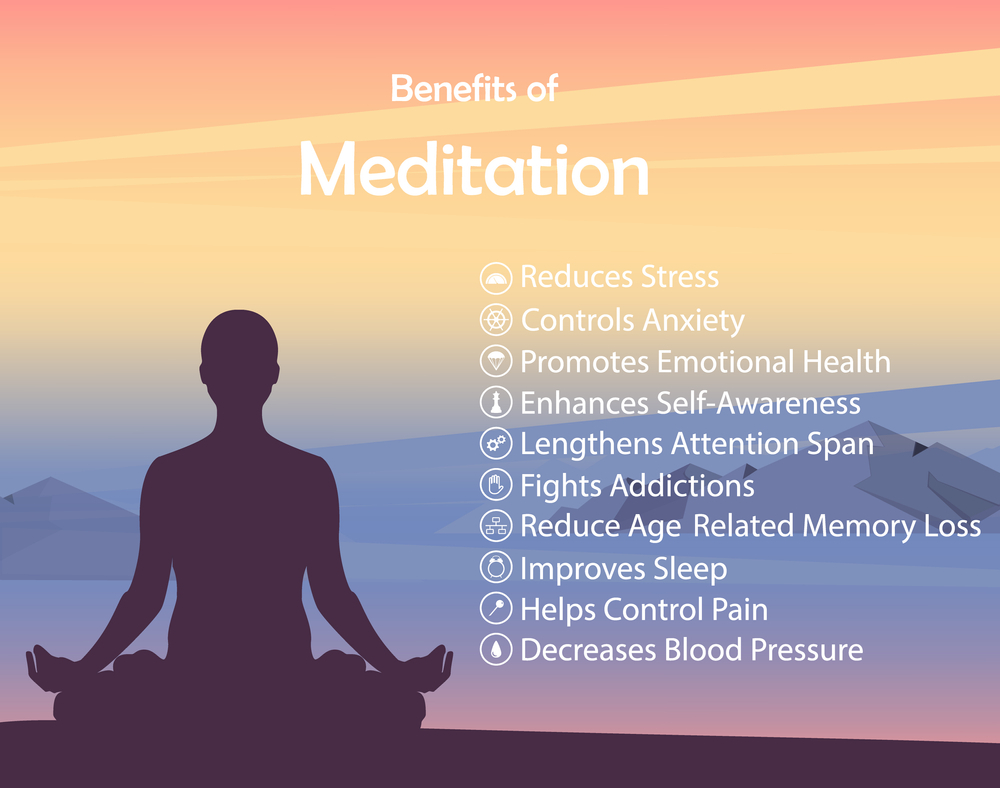

Meditation is the practice of focusing and redirecting your thoughts. Meditation has many benefits in everyday life. And amid the coronavirus pandemic, being present and finding tranquility is crucial. It might help you become more aware of your environment. It’s often thought of as a technique to relax and focus. Meditation and mindfulness can help us find some much-needed serenity in times of uncertainty and incapacity to predict the future. Other benefits of meditation on the brain, health, and skin are listed below.
ALSO READ: FUTURE OF FREELANCING IN 2022
Top benefits of meditation
Listed below are some top benefits of meditation to inspire you to meditate daily. Have a look –
1. Mediation relieves tension
Most people are drawn to meditation after learning that it reduces stress. Yes, meditation helps reduce stress and improves happiness, sleep, and creativity. Daily meditation is the greatest option for stress relief.
Adversity causes stress in the body. Immediate threats raise cortisol levels and stimulate the Autonomic Nervous System, which controls fight-or-flight reactions. Regular meditators have lower cortisol levels in their brains, which explains their resilience and insight.
2. Emotional wellness
Meditation, of course, can improve your emotional wellness. It helps us combat bad ideas and feelings that could otherwise overwhelm us.
Some forms of meditation can increase self-esteem and view on life.
Meditation can alleviate emotional and physical suffering, which is perhaps its most amazing benefit. Meditation has been demonstrated to boost self-esteem. It helps us see our minds and the thoughts that drive our emotions and actions.
According to studies, frequent meditation increases your brain’s gray matter (the area responsible for problem-solving and emotion control). The amygdala (a group of cells found at the base of the brain) shrinks when you meditate every day.
Stress-induced inflammatory molecules called cytokines can influence mood and cause sadness. Several studies show that meditation can improve depression by lowering inflammatory molecules.
3. Meditation raises self-awareness
To become self-aware, simply stop thinking. Meditation can also help in this situation. But if conventional meditation isn’t your thing, that’s fine too. There are numerous different ways to meditate and relax besides sitting cross-legged. Walking, gardening, listening to music, deep breathing, and just sitting. Meditation helps you become more self-aware while also enhancing your general health and well-being.
4. Enhances Memory
Meditation improves memory and prevents age-related memory loss. Regular meditation can help you focus and sharpen your intellect. This improves mental clarity and brain function.
Attention and clarity of thought may help keep the mind young.
Kirtan Kriya is a form of meditation that uses a mantra or chant together with finger repetition to focus the mind. It enhances performance on neuropsychological tests in adults with age-related memory decline.
Meditation can help individuals with dementia as well as typical age-related memory decline. It can also assist reduce stress and enhance coping in dementia caregivers. This is one of the major benefits of meditation.
5. Treats Sleep Disorders
Meditation is for people who suffer from sleeping difficulties like insomnia. Many studies show that those who meditate regularly sleep well and quickly. Meditation calms the body and relieves stress. This improves sleep quality and speed. In one study, participants who meditated slept longer and had less insomnia than those who did not meditate.
6. Reduce addiction
Do you know someone battling addiction? Meditation has the capacity to assist people to overcome difficult addictions. Many styles of meditation have been reported to help people overcome alcohol and drug addictions, including Vipassana meditation.
Meditation can modify brain receptors linked to drug and alcohol addiction, reducing cravings. Mindfulness meditation can also help you become more aware of urges and handle them better.
Meditation can help you establish mental discipline by enhancing self-control and awareness of addictive behavior triggers.
It may help people learn to shift their attention, manage their emotions and impulses, and comprehend the reasons for their problems.
Meditation may also reduce food cravings. Based on some studies, mindfulness meditation reduced emotional and binge eating.
7. Controls pain
Meditation has the capacity to relieve mental and physical pain. That’s right. That is an amazing scientific discovery.
Many doctors advocate mindful meditation as part of a pain management approach.
For example, a 2020 study of over 6,400 people in 60 trials indicated that meditation helped alleviate post-surgical, acute, or chronic pain.
It won’t fix everything and it won’t make the anguish go away. We can feel the agony, but not be trapped by it, and that can help us manage chronic pain.
Pain perception is linked to mental state and can be heightened under stressful situations. Meditation may help manage pain, according to some research. Mindfulness meditation can relieve chronic pain, improve quality of life, and lessen depression symptoms.
8. Reduces Blood Pressure
Meditation can also help the heart by lowering stress. High blood pressure makes the heart work harder to pump blood, eventually causing heart failure. High blood pressure contributes to atherosclerosis, which causes heart attacks and strokes. One study concluded that different styles of meditation improved blood pressure.
Part of the way meditation appears to lower blood pressure is by relaxing the nerve signals that coordinate heartbeat, blood vessel tension, and the “fight-or-flight” response.
Meditation can help lower blood pressure. High blood pressure is a common cause of heart failure. It makes the heart work harder to pump blood. Hypertension can cause heart attacks. Meditation is the best technique to reduce it. Regular meditation lowers blood pressure. This also reduces the risk of heart disease.
9. Meditation strengthens bonds
Want to improve your connections? Meditation has been demonstrated to improve social skills. How? It helps you empathize better and pick up on indications about how others are feeling. Meditation also improves emotional stability, making you less susceptible to negative influences.
10. It helps you become more loving or kind
Kindness Meditation can build self- and other-compassion. It increases brain circuits that detect other people’s emotions, encourages altruistic conduct, and reduces the implicit or unconscious bias that perpetuates harmful stereotypes.
To begin a loving-kindness meditation, visualize a loved one and wish them well. You can then love yourself and others.
You can think of a simple sentence like may you enjoy happiness and silently repeat it to yourself.

Meditation has various health benefits, both physical and mental. Try it out if you want to increase your focus, reduce stress, or deal with addiction, depression, or chronic pain. Please share if these benefits of meditation inspired you to meditate.







